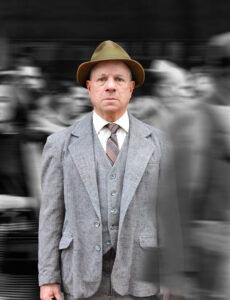by The Cowl Editor on October 5, 2017
Arts & Entertainment

by Elizabeth Janscy ’18
A&E Staff
It can be hard to determine what makes a play a classic. Some may say it is in the characters and their development throughout the play, whereas others may say it is the writing and realism of the words spoken between characters. Arthur Miller’s Death of a Salesman is one of those classic plays; not simply because of the characters or dialogues, but because of its chilling message that has touched audiences since 1949.
Death of a Salesman is a tale about Willy Loman and his desire to achieve the American Dream. Along with an intensely dark family dynamic, Willy becomes obsessed with success and wants nothing but the best for himself and his two sons. Willy soon finds out, however, that the finish line to success is miles away and the obstacles to get there are too great.
When this play first opened on Broadway in February 1949, it became an instant hit, winning the Tony Award for Best Play and the Pulitzer Prize for Drama. The show went on for 742 performances before later gaining buzz again in numerous Broadway revivals.
The reason this play was such a success then, and continues to be today, is the story of the play. The American Dream is something prevalent in everyone’s lives and the desire to be successful is a universal feeling and, oftentimes, a universal struggle.
On Sept. 28, Trinity Repertory Company in Downtown Providence held the first preview of their production of the show, which is set to open in early October. The theater was buzzing as everyone took their seats, anxiously waiting to see Trinity’s take on this theatrical staple. After witnessing all two hours and 45 minutes of it, it is safe to say it did not disappoint.

The most striking moments in the play were the scenes featuring Willy Loman (Stephen Berenson) and his son, Biff Loman (Matt Lytle). Both actors perfected the imperfect relationship between these two characters. The dynamic of the two lies between pure love and intense hate for one another. Willy wants what is best for Biff and believes he has so much potential, yet is frustrated by the fact that Biff seems to be throwing it all away. Biff, on the other hand, is confident in his plans for the future and wants nothing more than his father to mind his own business.
Both Berenson and Lytle played convincing parts, as they went back and forth with each other; the powerful intensity at which each challenged the other was clearly visible on stage. Most notable was the chilling scene towards the end of the play when, after the two men fight over Willy’s unrealistic expectations for Biff, they hug and cry. Biff sees that Willy just wants what is best for him and Willy is finally happy that Biff recognizes his side.
Seeing this play in person and done so well by Trinity Rep makes it easy to understand why it has stayed in the theater world for so long. The scenes that moved people when it premiered brought tears to the audience’s eyes. It is a play that still calls on the trials and tribulations of pursuing the American Dream, which is something that all Americans can relate to.